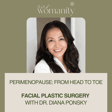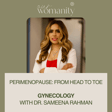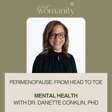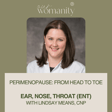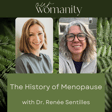Perimenopause and Skin Changes
00:00:00
Speaker
Have you noticed changes that have come up during perimenopause or in your 40s and beyond? Things like acne that you haven't had for decades or hair growth. on your upper lip or chin or in other places that used to not be so bad and now something you have to deal with every day. There are so many things that are affected by estrogen and testosterone and progesterone and the skin is our largest organ. So of course it's going to be affected. Tune in today to hear about how it's affected during perimenopause and menopause from an expert dermatologist.
00:00:31
Speaker
Dr. Mascower is an associate professor in the Department of Dermatology and the Department of OBGYN at UT Southwestern Medical Center. Her clinical practice is focused on women's health dermatology, addressing changes in skin and vulvar health that occur throughout different stages of life, which is why I have her on today to speak about
Dr. Mascower on Skin Aging and Dryness
00:00:49
Speaker
perimenopause. She cares for patients with everything from acute rashes to acne. However, she is an expert in treating patients with vulvar dermatoses.
00:00:56
Speaker
She's the founder and the director of the Vulvar Health Program at UT Southwestern and is an expert in her own right. So excited to have her on here today. All right. So as I mentioned, Dr. Melissa Moskauer is a good friend, but more importantly, an expert in dermatology. And she's the first person who came to mind when I thought of, okay, we're going to talk about skin and how perimenopause and menopause affects skin. do we need to know? So Moskauer, thank you so much for being here. what do we need to know about skin and perimenopause and menopause?
Estrogen's Role in Skin Health
00:01:28
Speaker
I'll say first off, perimenopause affects all parts of your skin from facial aging to dryness to your hair, and even flaring of other conditions that you may have had at different points in your life.
00:01:41
Speaker
So it really, as the largest organ of the body, the skin, really has a lot of manifestations of perimenopause. And I think we see that most often and kind of facial changes.
00:01:51
Speaker
And so I'll say that it's really interesting. In the 90s, before the WHI study came out, there were so many studies on skin and women on both topical and systemic estrogen levels.
00:02:05
Speaker
Oh, really? Yeah. Yeah. It's really interesting. I just think topical estrogen stuff is like brand new for being used on. Oh, Yeah. This has been going on for decades. Yes. Topical estrogens have been getting a lot of buzz lately, but really the first studies came out in the early 90s, like 1994 and 1996. And so these researchers looked at topical estrogen and they actually used one gram, which is a ton patients who face and neck and followed them for six-month period.
00:02:33
Speaker
um And there was actually and improvement in fine lines and wrinkles that they noticed. And actually, so many different researchers looked at dermis thickness after applying topical estrogen. They did a bunch of biopsies and found that you can have up to a 33% increase in dermal thickness Yes.
00:02:52
Speaker
And especially, you know, we've got the um epidermis, which deals with a lot of that moisture loss, which that's the top layer of the skin. And then the dermis
Preventative Estrogen Use for Skin Health
00:03:00
Speaker
is where kind of the collagen lives and a lot of other glycosmenoglycans, all these agents that work together to pull in water.
00:03:07
Speaker
And so, you know, I made ah an interesting post about that couple months ago, because and feel like there's all these companies looking at different forms of topical estrogen, but we really need to do And again, lot of them have been done in the ninety s a long time ago. And that's also when they were using Premarin, right? So it was like, yes, and yeah, horse urine. I tell all my patients, was like, okay, I see that you're on Premarin.
00:03:32
Speaker
Did you know that's conjugated horse urine? And we've got things that are cheaper now, $13. It's so much better. But they, again, they did a lot of those studies. But what I want to look at is the topical retinoids compared to topical estrogens.
00:03:45
Speaker
Because we know in dermatology that retinoids have been turnover and everything. But finding funding for studies like that is hard because, know, it's considered cosmetic.
00:03:56
Speaker
Oh, but that would be so cool. I would gladly be a participant in your study. but but i think it is amazing. I mean, right there is the aging. Like I look back at my my hospital badge or my profile from five years ago. And then I'm like, oh yeah, I can see...
00:04:10
Speaker
I can see the changes, but I'm like, what's aging and what's hormonal fluctuation? Do you have a good way of like explaining to people the difference between the two or is it really all the same?
00:04:21
Speaker
I think it's probably really tied together, but thinking about when patients like transition into menopause, I think it's less chronological aid or depending on like your hormonal status.
00:04:35
Speaker
um So I do think that patients that go through menopause later and therefore perimenopause later will have longer stores of estrogen, you know, but but again, i think all of these changes are something that you should talk to your doctor about because there are things we can do to prevent them. And, you know, what I'm interested in and over the next couple years is the preventative strategies. Should we start doing things like topical estrogen when you're going through perimenopause for your skin? Or i don't know for your patients, you know, if you recommend that they start low dose estrogen in perimenopause if they're known. I think that's all those conversations that we need to have and dive deeper into.
00:05:12
Speaker
Yeah. I recommend it for a lot of people and it's it's individualized, but I do recommend it for a lot of young people, young younger people in perimenopause, because I do think there's probably a lot of prevention that we're not aware of. And if they're starting to have some symptoms already, so I'd almost think like skin is the same. If you start to see some signs of change already, then probably there's some benefit, but you're right. We don't really know and like how to compare it to everything else. We're still on the new frontier for all of that, even though that research started in the nineties, which I didn't know until today. And I will say that there was another study that looked at women that were on systemic estrogen. And when you start systemic estrogen earlier, and we're talking about skin here, but when you start a little bit earlier, it's thought to
00:05:53
Speaker
decrease the degradation of collagen compared to if you start it later that it may help build it up.
Hair Thinning and Treatments
00:06:00
Speaker
So in theory, shouldn't we do both of those things? I think that we'd want both of those, you know, to sustain our best healthy self.
00:06:07
Speaker
Yeah, exactly. That's so interesting. Okay. Talk to me about hair because I, a lot of my patients struggle with hair changes, hair loss, hair thinning, and that's part of perimenopause and menopause too, right? Yes.
00:06:20
Speaker
And I will say that over time, you know, a lot of women have thinning of the scalp midline. So that's kind of where things start. um You have a wider part midline. There are a lot of estrogen receptors in the scalp and a lot of patients notice those changes you know throughout time.
00:06:35
Speaker
Right now, hair is also having just a huge surge with different topical or oral medicines that you can take to supplement your hair growth. You know, oral minoxidil is kind of the new pill of the moment.
00:06:47
Speaker
Topical minoxidil or Rogaine's been around for a really long time as scale well. I will say between those two things, oral minoxidil grows hair everywhere. And there was a nice study that compared topical efficacy compared to oral.
00:07:04
Speaker
and so if you just put it where you want it compared to just you know orly patient Yeah. And if you put on the back of your hand, it will grow hair there. It's really good at growing hair. So you have to be careful.
00:07:15
Speaker
Oh no, it was actually like very serendipitous. It's a blood pressure medication. um And so they noticed in that study that patients were having more full hair. It's really fascinating for dermatology. Now yeah we typically recommend lower dose oral minoxidil. So it's a 2.5 milligram pill.
00:07:31
Speaker
And depending on your situation, because it can cause lower blood pressure, you can do a half a pill or a fourth a pill. There's alternate day dosings you can do if you're starting to get hirsutism or more hair growth, other placements, but just some things to look out for.
00:07:44
Speaker
Okay. Otherwise you could just get the topical and directly apply it to the scalp. Yeah. And I, and the hair has a long life cycle, right? I usually warn my patients, like whatever you're going to use. And even if, if estrogen might help to stabilize your hair follicles, which is what I think, I mean, I'm not a dermatologist. It's like my very cursory knowledge, but like, I usually tell them that they're not going to necessarily see the full effects until six months later. Is that true?
00:08:09
Speaker
Exactly true. And what's what's interesting with the topical minoxidil is when you first start using it, It actually helps link up the hair cycles. And so you may get more shedding when you initially start it, which freaks a lot of people out. They're like, oh, I'm supposed to use this for hair growth.
00:08:26
Speaker
That's actually a good sign. And so often when patients have that initial shedding, we know that they're going to have a good benefit from the topical material. So interesting. I've had patients who've had hair loss when they were starting hormone therapy, which I was not expecting whatsoever. I mean, testosterone is separate. Like we can talk about that too, but just, you know, estrogen, progesterone, hormone therapy. And I wonder, i wonder if that is similar or if that was just a ah weird side effect, but regardless for, you know, people who've experienced that, I can understand why they may not want to go through that if they're already having some shedding or worried about the hair loss.
00:09:01
Speaker
Yeah, I will say that everyone notices that during pregnancy, they have very long, full hair. And that's because, you know, our estrogen is highest during pregnancy. So I think as the estrogen starts getting lower, you know, starting in paramenopause, that's when you notice changes.
00:09:15
Speaker
I've had some patients come in and they're on topical testosterone, but oral spironolactone to protect their hair because a lot of patients will have hair loss when they're on testosterone supplementation. Yes.
00:09:27
Speaker
So, I mean, my, my thought is, you know, could there be other ways that we look at things instead of giving you one thing? And then, so minoxidil, I feel like it's a nice way. I mean, I can tell patients who will have hair loss, like testosterone is contraindicated for you because it's only going to make things worse. And if you add spironolactone, then you're going to decrease their libido.
00:09:46
Speaker
It's like, okay, let's not go down that road. Doctor, good doctor. Yeah, thank you. But you know, I mean, it's also because people see me for sex issues, like sexual function too. So maybe, maybe if you really need your hair and you're not so worried about your libido, I don't know,
Supplements for Skin and Hair Health
00:10:00
Speaker
but it's so interesting. And I want to ask you because you mentioned, you know, the different medications and things that are out there that are coming out too, but they also see so much of like supplements that are out there and collagen, biotin, all of these different things to try to help your skin and your hair and Is there any worth behind any of them? Like, what is the deal? Because I see them even like at the grocery store being added to a soft drink or whatever. I'm like, I don't know I need that much collagen. Yeah, I will say that we could have a whole hour long conversation on supplements. And i find it completely fascinating. i always tell my patients, let's get your supplements from your food.
00:10:37
Speaker
So things I love for skin health and hair health are, you know, fermented foods like kimchi or kefir. We also like just supplementation wise. I mean, I do think the vitamin C serums work really well.
00:10:49
Speaker
If you're going to do protein again, getting that from your food, not whey protein. Because whey can really flare acne and other inflammatory skin conditions. And so many diet or protein supplements. went down to the aisle you know at a bulk store that sells things in bulk. And I was just amazed at the amount of whey protein supplements that they're selling out to people. But specifically talking about collagen. So the last time I kind of dove into things.
00:11:13
Speaker
And again, this is getting... so much hype on social media. wow There's really not ah study that I am familiar with that shows that ingested collagen can be broken down and then make it to your skin.
00:11:27
Speaker
I think that there's several meta-analyses that have come out recently and those individual components may be different. I think bone health is different. But really, when we're thinking about collagen, I don't know how much is really going to make it to people's
Hormonal Acne and Treatments
00:11:40
Speaker
skin. And again, putting it in coffee now or whatever else people add collagen to is interesting. interesting Things that you can put on your skin like help hydrate your dermis to get more full, I think is there something to that.
00:11:53
Speaker
conversation. Okay. No fountain of youth, I feel like in a supplement so far. Unfortunately. yeah but But the biotin is another really interesting thought when you think about it, because Nutrafol actually has like thousands more percent of biotin than you will need to help with your hair growth. And when you take excess biotin, it actually can falsely lower your like cardiac enzymes and also mess with your thyroid enzymes so much that like the CDC put out a warning about ingesting biotin because a guy actually had a heart attack but was found to have normal cardiac enzymes because he was taking too much of it.
00:12:31
Speaker
So I think in moderation, great. Like vitamins, great, but may not want to overdo it. Yeah, exactly. And if you can get anything from your diet, that makes way more sense.
00:12:42
Speaker
Way more sense. Oh, that's so interesting. Okay. So what about acne? Because I hear my patients talk about acne coming out in perimenopause and menopause and they're like what in the world? Is that something that's really associated with perimenopause and menopause?
Autoimmune Skin Conditions Post-Menopause
00:12:55
Speaker
I think hormonal acne is really heavy offender in this age range, you know, mid thirties. And especially, honestly, if you escaped it during teenage years, I find out it comes out more in like the perimenopause years. ah So you can't get away from it, but screnolactone works incredibly well.
00:13:15
Speaker
And so that's, you know, an oral pill that we take, as we mentioned earlier, it also can help grow your hair. So there's a two for benefit there, but it really helps with hormonal acne side effects of it. It can cause Like cramping, sometimes some breast tenderness or irregular spotting in periods, but I haven't had patients that have wanted to go off of that because they haven't been as bad as the benefit that they see from it for their acne. That makes sense.
00:13:39
Speaker
That makes sense. Yeah. There's so many interesting things. The other thing I wanted to bring up is sort of the autoimmune conditions. I mean, I think you and I have talked about the vulva a lot and the vulvar dermatoses, and maybe I'll just give you a hypothetical patient example. woman came to see me and has a history of lichen planus on her scalp, lichen planus affecting her face.
00:14:01
Speaker
And she's coming in to see me because she's having burning and itching on her perineum and vulva and can't figure out what's going on. And I'm like, I'll Of course, it's lichen planus. Like I can tell you even before examining you, it's probably lichen planus. And, you know, she had also been told that this was probably coming out more during menopause. And that I mean, that's what we tell people to write, we see low estrogen states with some of these vulvar dermatoses, but sometimes people are not associating them with other dermatoses or dermatological conditions in the rest of their body. But that it is a thing, right? That it it happens after perimenopause or during or after perimenopause and menopause?
00:14:35
Speaker
Yeah, I think it's the interplay between having lower estrogen, more water, transepidermal water loss. um So you get a lot more symptoms with even common conditions. So things like atopic dermatitis, psoriasis, lichen planus, a lot of these things can become more symptomatic or actually you know manifest more during that perimenopause, menopause period. I think that you know our skin is a really dynamic, interesting organ and it actually
Vaginal Estrogen for Skin Issues
00:15:00
Speaker
creates its own hormones too, which is something that one of my colleagues studies a lot, but but it it is really interesting. And especially with vulvar conditions, you know i think
00:15:09
Speaker
people develop dryness or, you know, symptoms of genitourinary syndrome or menopause, you know, they may blame it on one skin condition and it's really the other or it's the interaction. Right, right. And I think that's a good point. Maybe it's a good public service announcement that if you are perimenopausal or menopausal and you have a vulvar dermatosis, like in sclerosis, like in planus, don't know if psoriasis quite the same or not, but I would think so. I really, anything with dryness, then you may want to talk to your healthcare care professional about being on vaginal estrogen as well. That's something, as long as the patient doesn't have any contraindications, and there are very few contraindications for vaginal estrogen, I try to get my patients on vaginal estrogen along with whatever we're doing for the treatment for their vulva. hundred percent. And as I mentioned, that was some of those early nineties studies show that went just
00:15:57
Speaker
applying topical estrogen three times a week. This one group in 94 did on the buttocks and they did it under like occlusion, but then they took biopsies and found that you had an increase in dermal thickness.
00:16:08
Speaker
You're just three times a week and doing that. So even if maybe, I wonder if like people are having facial like in plan is like they should be using topical estrogen maybe too. I mean, it, what's interesting about our faces it's, it can be very hormonally sensitive. So things like melasma that happens more in pregnancy you know, if we're using topical estrogen, some of those 1990 studies found that up to 11% of women develop melasma.
00:16:33
Speaker
That's the point. Melasma is like this masking, like a mask kind of distribution. You probably can explain it better than that, but well I always saw
Testosterone's Impact on Skin
00:16:40
Speaker
it on our pregnant patients, right? Yeah, no, it's that hyperpigmented, like brown coloration. You can also have increased blood vessels.
00:16:46
Speaker
So I feel like, you know, i think it is important not to just like go so home and smother all this on your face. But definitely talk to a dermatologist or your you know doctor about, you know, if that would be a good something for you to do um until we kind of update our studies a little Yeah, you're right. Because if sometimes high levels can cause other problems. Can we talk a little bit about testosterone too? Because we have a lot of women in perimenopause and menopause who are on testosterone for low libido. And what would they expect to see changing with their hair or their face or or anything? What should they be on a lookout for?
00:17:17
Speaker
You know, it's funny. I don't know about you, but I can always tell patients that are on too much testosterone. come in and they have much lower voices. They have very sparse hair, especially here. They're getting very pointed features.
00:17:32
Speaker
Sometimes they can even be a little bit more tan. I do think that your skin and your vulva can definitely, you know, skin on your arms, but other places too, can dry out with too much testosterone. And so I definitely think that it can impact your skin. You can develop itching or picking because of that dry skin. So you have to have that balance of, yes, you know, a lot of patients do need it for libido, but you can go the other way and develop a lot more of these. Even for libido, it's only recommended to be at premenopausal ranges. So like not the whopping doses that people are getting from testosterone polish, just another public service. yes Please, please. We don't need many penises out there. Yeah. And all the other things like hair growth, acne, oily skin, right? That's other stuff I usually tell people look out for. oh but that's interesting. I feel like I don't see a lot of patients who are on
Non-Menopause Related Skin Changes
00:18:20
Speaker
pellets here, but that description
00:18:23
Speaker
Exactly. We have them, a lot of them, unfortunately. And again, it's different, i think, than, you know, someone that needs a little bit of topical testosterone or they're working with their provider monitoring those levels. I think pellets can be really dangerous, especially when people start getting addicted to pellets and then they're coming in more frequently or just getting subcutaneous injections too, which is what I had some recent patients getting also. Wow. Anything else that people should be on the lookout for at this time of their life? Is there like anything else that they should be keeping in mind? Okay, this is not just perimenopause. This is something else that I need to see a dermatologist about.
00:18:56
Speaker
Yeah, I think a lot of the things we talked about can be applied just to regular, i guess, everyday skin changes, you know, dry skin hand eczema, hair shedding or loss, but a lot of times other conditions can affect those too.
00:19:10
Speaker
Like if you have vessels on your hands or you're getting a lot of hand breakdown, that's probably not just dryness related to perimenopause. You may have hand dermatitis, eczema, contact dermatitis. I think that a lot of times we see, you know, fine changes. I know you wrote this lovely poem that I love about why I wish my vulva was my face, which I still talk about all the time. And we know that, you know, over time we do lose our dermal fullness and you do get some sagging, and but there are some conditions where your so your mouth changes and you actually have narrow opening to your mouth or hardening of your skin that can be a sign of other, you know, autoimmune diseases. I think thyroid conditions also get misdiagnosed sometimes as perimenopause or the other way around.
Importance of Sunscreen for Aging Skin
00:19:50
Speaker
Yeah. Okay. Well, thank you so much. This has been super helpful and we would be remiss if we didn't say protect your skin. We've seen Sunscreen too. I guess I almost forgot about sunscreen. I think, that was um I think sunscreen is one of the best things you can do no matter why age you're at. Definitely starting even before perimenopause, I think finding a good routine, find something that you like the way it feels and leaves your skin. And just after you brush your teeth in the morning, face, neck, hands, and arms, because again, as you go through perimenopause and menopause, and then you get to seventies, eighties, nineties, the earlier you can have that really good sun protection routine,
00:20:25
Speaker
the better. We know all of these aging factors, multifactorial, right? It depends on your estrogen status, but also your cumulative sun exposure. I know everyone has seen patients that are in their 70s, 80s with flip bruises on their arms from decreased dermal thickness. And so you can prevent that now in perimenopause by adding sunscreen you know to your arms on a daily basis.
00:20:47
Speaker
Oh my goodness. I have to admit, I do not put sunscreen on my arms and my hands on a regular basis. I mean, unless I'm going out and going to be in. That's a really good point. And I always think that hands are kind of like the secret to seeing what age a person is. Right. and We all know the person who looks like a decade younger than they actually are or someone who's had a plastic surgery. And you look at their hands and you're like, oh, actually.
Conclusion and Skin Care Importance
00:21:10
Speaker
see And if you start putting sunscreen on your hands, have not been doing that. I'm going to start doing that. Awesome. Well, thank you so much for your time. I really appreciate it And i know all of our listeners are so lucky to have your expertise here today.



